 полная версия
полная версияThe Illustrated London Reading Book
A CHAPTER ON DOGS
Newfoundland Dogs are employed in drawing sledges laden with fish, wood, and other articles, and from their strength and docility are of considerable importance. The courage, devotion, and skill of this noble animal in the rescue of persons from drowning is well known; and on the banks of the Seine, at Paris, these qualities have been applied to a singular purpose. Ten Newfoundland dogs are there trained to act as servants to the Humane Society; and the rapidity with which they cross and re-cross the river, and come and go, at the voice of their trainer, is described as being most interesting to witness. Handsome kennels have been erected for their dwellings on the bridges.
DALMATIAN DOGThere is a breed of very handsome dogs called by this name, of a white colour, thickly spotted with black: it is classed among the hounds. This species is said to have been brought from India, and is not remarkable for either fine scent or intelligence. The Dalmatian Dog is generally kept in our country as an appendage to the carriage, and is bred up in the stable with the horses; it consequently seldom receives that kind of training which is calculated to call forth any good qualities it may possess.
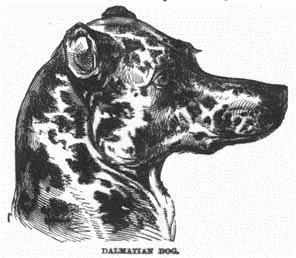
TERRIER
The Terrier is a valuable dog in the house and farm, keeping both domains free from intruders, either in the shape of thieves or vermin. The mischief effected by rats is almost incredible; it has been said that, in some cases, in the article of corn, these little animals consume a quantity in food equal in value to the rent of the farm. Here the terrier is a most valuable assistant, in helping the farmer to rid himself of his enemies. The Scotch Terrier is very common in the greater part of the Western Islands of Scotland, and some of the species are greatly admired. Her Majesty Queen Victoria possesses one from Islay—a faithful, affectionate creature, yet with all the spirit and determination that belong to his breed.
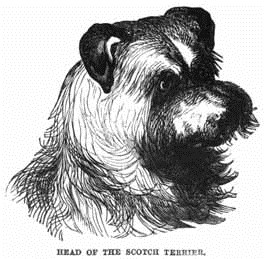
THE GREYHOUND
The modern smooth-haired Greyhound of England is a very elegant dog, not surpassed in speed and endurance by that of any other country. Hunting the deer with a kind of greyhound of a larger size was formerly a favourite diversion; and Queen Elizabeth was gratified by seeing, on one occasion, from a turret, sixteen deer pulled down by greyhounds upon the lawn at Cowdry Park, in Sussex.
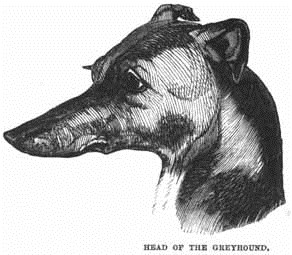
OLD ENGLISH HOUND
The dog we now call the Staghound appears to answer better than any other to the description given to us of the old English Hound, which was so much valued when the country was less enclosed, and the numerous and extensive forests were the harbours of the wild deer. This hound, with the harrier, were for many centuries the only hunting dogs.
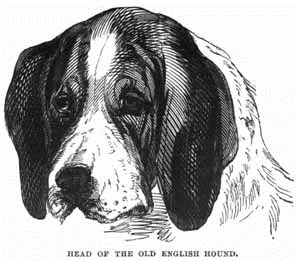
SHEPHERD'S DOG
Instinct and education combine to fit this dog for our service: the pointer will act without any great degree of instruction, and the setter will crouch; but the Sheep Dog, especially if he has the example of an older one, will, almost without the teaching of his master, become everything he could wish, and be obedient to every order, even to the slightest motion of the hand. If the 's dog be but with his master, he appears to be perfectly content, rarely mingling with his kind, and generally shunning the advances of strangers; but the moment duty calls, his eye brightens, he springs up with eagerness, and exhibits a sagacity, fidelity, and devotion rarely equalled even by man himself.
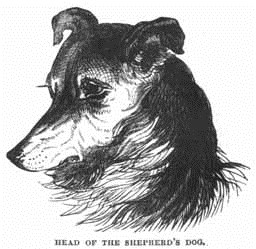
BULL-DOG
Of all dogs, none surpass in obstinacy and ferocity the Bull-dog. The head is broad and thick, the lower jaw generally projects so that the under teeth advance beyond the upper, the eyes are scowling, and the whole expression calculated to inspire terror. It is remarkable for the pertinacity with which it maintains its hold of any animal it may have seized, and is, therefore, much used in the barbarous practice of bull-baiting, so common in some countries, and but lately abolished in England.

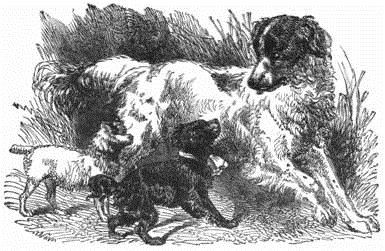
LORD BACON
In those prescient views by which the genius of Lord Bacon has often anticipated the institutions and the discoveries of succeeding times, there was one important object which even his foresight does not appear to have contemplated. Lord Bacon did not foresee that the English language would one day be capable of embalming all that philosophy can discover, or poetry can invent; that his country would at length possess a national literature of its own, and that it would exult in classical compositions, which might be appreciated with the finest models of antiquity. His taste was far unequal to his invention. So little did he esteem the language of his country, that his favourite works were composed in Latin; and he was anxious to have what he had written in English preserved in that "universal language which may last as long as books last."
It would have surprised Bacon to have been told that the most learned men in Europe have studied English authors to learn to think and to write. Our philosopher was surely somewhat mortified, when, in his dedication of the Essays, he observed, that, "Of all my other works, my Essays have been most current; for that, as it seems, they come home to men's business and bosoms." It is too much to hope to find in a vast and profound inventor, a writer also who bestows immortality on his language. The English language is the only object, in his great survey of art and of nature, which owes nothing of its excellence to the genius of Bacon.
He had reason, indeed, to be mortified at the reception of his philosophical works; and Dr. Rowley, even, some years after the death of his illustrious master, had occasion to observe, "His fame is greater, and sounds louder in foreign parts abroad than at home in his own nation; thereby verifying that Divine sentence, 'A Prophet is not without honour, save in his own country and in his own house,'" Even the men of genius, who ought to have comprehended this new source of knowledge thus opened to them, reluctantly entered into it: so repugnant are we to give up ancient errors, which time and habit have made a part of ourselves.
D'Israeli.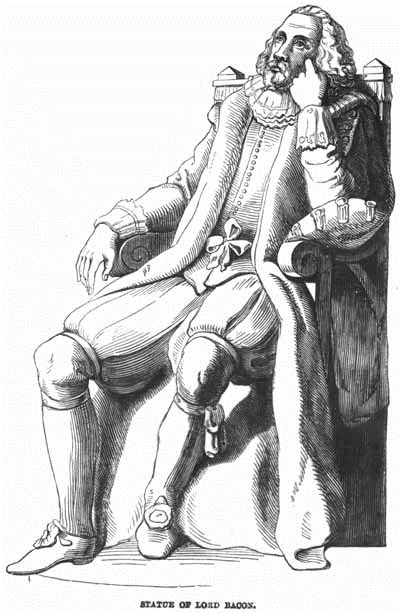
THE LILIES OF THE FIELD
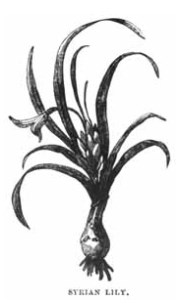
POMPEII
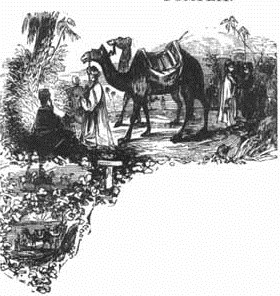
The earliest and one of the most fatal eruptions of Mount Vesuvius that is mentioned in history took place in the year 79, during the reign of the Emperor Titus. All Campagna was filled with consternation, and the country was overwhelmed with devastation in every direction; towns, villages, palaces, and their inhabitants were consumed by molten lava, and hidden from the sight by showers of volcanic stones, cinders, and ashes.
Pompeii had suffered severely from an earthquake sixteen years before, but had been rebuilt and adorned with many a stately building, particularly a magnificent theatre, where thousands were assembled to see the gladiators when this tremendous visitation burst upon the devoted city, and buried it to a considerable depth with the fiery materials thrown from the crater. "Day was turned to night," says a classic author, "and night into darkness; an inexpressible quantity of dust and ashes was poured out, deluging land, sea, and air, and burying two entire cities, Pompeii and Herculaneum, whilst the people were sitting in the theatre."
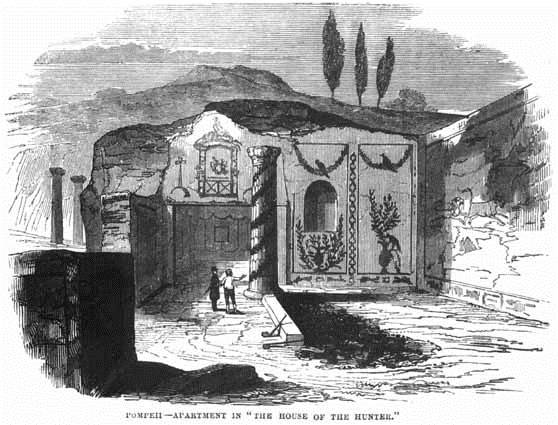
Many parts of Pompeii have, at various times, been excavated, so as to allow visitors to examine the houses and streets; and in February, 1846, the house of the Hunter was finally cleared, as it appears in the Engraving. This is an interesting dwelling, and was very likely the residence of a man of wealth, fond of the chase. A painting on the right occupies one side of the large room, and here are represented wild animals, the lion chasing a bull, &c. The upper part of the house is raised, where stands a gaily-painted column—red and yellow in festoons; behind which, and over a doorway, is a fresco painting of a summer-house perhaps a representation of some country-seat of the proprietor, on either side are hunting-horns. The most beautiful painting in this room represents a Vulcan at his forge, assisted by three dusky, aged figures. In the niche of the outward room a small statue was found, in terra cotta (baked clay). The architecture of this house is singularly rich in decoration, and the paintings, particularly those of the birds and vases, very bright vivid.

At this time, too, some very perfect skeletons were discovered in a house near the theatre, and near the hand of one of them were found thirty-seven pieces of silver and two gold coins; some of the former were attached to the handle of a key. The unhappy beings who were perished may have been the inmates of the dwelling. We know, from the account written by Pliny, that the young and active had plenty of time for escape, and this is the reason why so few skeletons have been found in Pompeii.
In a place excavated at the expense of the Empress of Russia was found a portable kitchen (represented above), made of iron, with two round holes for boiling pots. The tabular top received the fire for placing other utensils upon, and by a handle in the front it could be moved when necessary.
THE NIGHTINGALE AND GLOWWORM
A Nightingale that all day longHad cheer'd the village with his song,Nor yet at eve his note suspended,Nor yet when even-tide was ended—Began to feel, as well he might,The keen demands of appetite:When, looking eagerly around,He spied, far off upon the ground,A something shining in the dark,And knew the glowworm by his spark:So stooping down from hawthorn top,He thought to put him in his crop.The worm, aware of his intent,Harangued him thus, right eloquent:—"Did you admire my lamp," quoth he,"As much as I your minstrelsy,You would abhor to do me wrong,As much as I to spoil your song;For 'twas the self-same power DivineTaught you to sing and me to shine,That you with music, I with light,Might beautify and cheer the night."The songster heard his short oration,And, warbling out his approbation,Released him, as my story tells,And found a supper somewhere else.Cowper.THE INVISIBLE WORLD REVEALED BY THE MICROSCOPE
A fact not less startling than would be the realisation of the imaginings of Shakespeare and of Milton, or of the speculations of Locke and of Bacon, admits of easy demonstration, namely, that the air, the earth, and the waters teem with numberless myriads of creatures, which are as unknown and as unapproachable to the great mass of mankind, as are the inhabitants of another planet. It may, indeed, be questioned, whether, if the telescope could bring within the reach of our observation the living things that dwell in the worlds around us, life would be there displayed in forms more diversified, in organisms more marvellous, under conditions more unlike those in which animal existence appears to our unassisted senses, than may be discovered in the leaves of every forest, in the flowers of every garden, and in the waters of every rivulet, by that noblest instrument of natural philosophy, the Microscope.
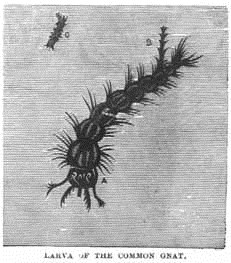
Larva of the Common Gnat.
A. The body and head of the larva (magnified).
B. The respiratory apparatus, situated in the tail.
C. Natural size.
To an intelligent person, who has previously obtained a general idea of the nature of the Objects about to be submitted to his inspection, a group of living animalcules, seen under a powerful microscope for the first time, presents a scene of extraordinary interest, and never fails to call forth an expression of amazement and admiration. This statement admits of an easy illustration: for example, from some water containing aquatic plants, collected from a pond on Clapham Common, I select a small twig, to which are attached a few delicate flakes, apparently of slime or jelly; some minute fibres, standing erect here and there on the twig, are also dimly visible to the naked eye. This twig, with a drop or two of the water, we will put between two thin plates of glass, and place under the field of view of a microscope, having lenses that magnify the image of an object 200 times in linear dimensions.
Upon looking through the instrument, we find the fluid swarming with animals of various shapes and magnitudes. Some are darting through the water with great rapidity, while others are pursuing and devouring creatures more infinitesimal than themselves. Many are attached to the twig by long delicate threads, several have their bodies inclosed in a transparent tube, from one end of which the animal partly protrudes and then recedes, while others are covered by an elegant shell or case. The minutest kinds, many of which are so small that millions might be contained in a single drop of water, appear like mere animated globules, free, single, and of various colours, sporting about in every direction. Numerous species resemble pearly or opaline cups or vases, fringed round the margin with delicate fibres, that are in constant oscillation. Some of these are attached by spiral tendrils; others are united by a slender stem to one common trunk, appearing like a bunch of hare-bells; others are of a globular form, and grouped together in a definite pattern, on a tabular or spherical membranous case, for a certain period of their existence, and ultimately become detached and locomotive, while many are permanently clustered together, and die if separated from the parent mass. They have no organs of progressive motion, similar to those of beasts, birds, or fishes; and though many species are destitute of eyes, yet possess an accurate perception of the presence of other bodies, and pursue and capture their prey with unerring purpose.
Mantell's Thoughts on Animalcules.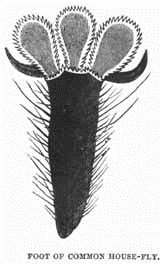
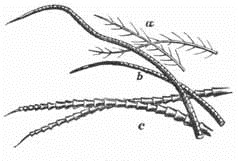
Hair, Greatly Magnified.
A. Hairs of the Bat.
B. Of the Mole.
C. Of the Mouse.
THE CANARY
This bird, which is now kept and reared throughout the whole of Europe, and even in Russia and Siberia, on account of its pretty form, docility, and sweet song, is a native of the Canary Isles. On the banks of small streams, in the pleasant valleys of those lovely islands, it builds its nest in the branches of the orange-trees, of which it is so fond, that even in this country the bird has been known to find its way into the greenhouse, and select the fork of one of the branches of an orange-tree on which to build its nest, seeming to be pleased with the sweet perfume of the blossoms.
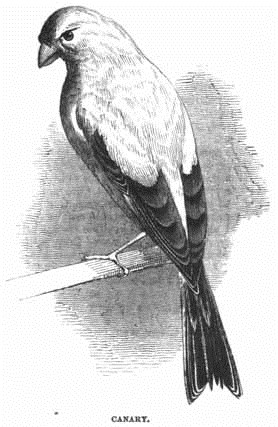
The bird has been known in Europe since the beginning of the sixteenth century, when a ship, having a large number of canaries on board destined for Leghorn, was wrecked on the coast of Italy. The birds having regained their liberty, flew to the nearest land, which happened to be the island of Elba, where they found so mild a climate that they built their nests there and became very numerous. But the desire to possess such beautiful songsters led to their being hunted after, until the whole wild race was quite destroyed. In Italy, therefore, we find the first tame canaries, and here they are still reared in great numbers. Their natural colour is grey, which merges into green beneath, almost resembling the colours of the linnet; but by means of domestication, climate, and being bred with other birds, canaries may now be met with of a great variety of colours. But perhaps there is none more beautiful than the golden-yellow, with blackish-grey head and tail. The hen canary lays her eggs four or five times a year, and thus a great number of young are produced.
As they are naturally inhabitants of warm climates, and made still more delicate by constant residence in rooms, great care should be taken in winter that this favourite bird be not exposed to cold air, which, however refreshing to it in the heat of summer, is so injurious in this season that it causes sickness and even death. To keep canaries in a healthy and happy state, it is desirable that the cage should be frequently hung in brilliant daylight, and, if possible, placed in the warm sunshine, which, especially when bathing, is very agreeable to them. The more simple and true to-nature the food is, the better does it agree with them; and a little summer rapeseed mixed with their usual allowance of the seed to which they have given their name, will be found to be the best kind of diet. As a treat, a little crushed hempseed or summer cabbage-seed may be mixed with the canary-seed. The beautiful grass from which the latter is obtained is a pretty ornament for the garden; it now grows very abundantly in Kent.
The song of the canary is not in this country at all like that of the bird in a state of nature, for it is a kind of compound of notes learned from other birds. It may be taught to imitate the notes of the nightingale, by being placed while young with that bird. Care must be taken that the male parent of the young canary be removed from the nest before the young ones are hatched, or it will be sure to acquire the note of its parent. The male birds of all the feathered creation are the only ones who sing; the females merely utter a sweet chirrup or chirp, so that from the hen canary the bird will run no risk of learning its natural note.
INDUSTRY AND APPLICATION
Diligence, industry, and proper improvement of time are material duties of the young. To no purpose are they endowed with the best abilities, if they want activity for exerting them. Unavailing, in this case, will be every direction that can be given them, either for their temporal or spiritual welfare. In youth the habits of industry are most easily acquired; in youth the incentives to it are strong, from ambition and from duty, from emulation and hope, from all the prospects which the beginning of life affords. If, dead to these calls, you already languish in slothful inaction, what will be able to quicken the more sluggish current of advancing years? Industry is not only the instrument of improvement, but the foundation of pleasure. Nothing is so opposite to the true enjoyment of life as the relaxed and feeble state of an indolent mind. He who is a stranger to industry, may possess, but he cannot enjoy. For it is labour only which gives the relish to pleasure. It is the appointed vehicle of every good man. It is the indispensable condition of our possessing a sound mind in a sound body. Sloth is so inconsistent with both, that it is hard to determine whether it be a greater foe to virtue or to health and happiness. Inactive as it is in itself, its effects are fatally powerful. Though it appear a slowly-flowing stream, yet it undermines all that is stable and flourishing. It not only saps the foundation of every virtue, but pours upon you a deluge of crimes and evils.
It is like water which first putrefies by stagnation, and then sends up noxious vapours and fills the atmosphere with death. Fly, therefore, from idleness, as the certain parent both of guilt and of ruin. And under idleness I include, not mere inaction only, but all that circle of trifling occupations in which too many saunter away their youth; perpetually engaged in frivolous society or public amusements, in the labours of dress or the ostentation of their persons. Is this the foundation which you lay for future usefulness and esteem? By such accomplishments do you hope to recommend yourselves to the thinking part of the world, and to answer the expectations of your friends and your country? Amusements youth requires: it were vain, it were cruel, to prohibit them. But, though allowable as the relaxation, they are most culpable as the business, of the young, for they then become the gulf of time and the poison of the mind; they weaken the manly powers; they sink the native vigour of youth into contemptible effeminacy.
Blair.THE RIVER JORDAN
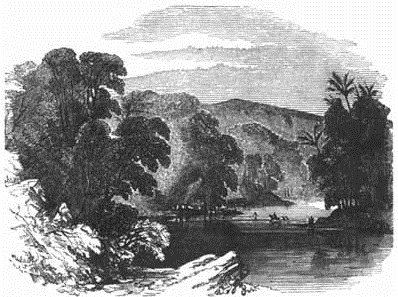
The river Jordan rises in the mountains of Lebanon, and falls into the little Lake Merom, on the banks of which Joshua describes the hostile Kings as pitching to fight against Israel. After passing through this lake, it runs down a rocky valley with great noise and rapidity to the Lake of Tiberias. In this part of its course the stream is almost hidden by shady trees, which grow on each side. As the river approaches the Lake of Tiberias it widens, and passes through it with a current that may be clearly seen during a great part of its course. It then reaches a valley, which is the lowest ground in the whole of Syria, many hundred feet below the level of the Mediterranean Sea. It is so well sheltered by the high land on both sides, that the heat thus produced and the moisture of the river make the spot very rich and fertile. This lovely plain is five or six miles across in parts, but widens as it nears the Dead Sea, whose waters cover the cities of Sodom and Gomorrah, destroyed for the wickedness of their inhabitants.
ON JORDAN'S BANKS
On Jordan's banks the Arab camels stray,On Sion's hill the False One's votaries pray—The Baal-adorer bows on Sinai's steep;Yet there—even there—O God! thy thunders sleep:There, where thy finger scorch'd the tablet stone;There, where thy shadow to thy people shone—Thy glory shrouded in its garb of fire(Thyself none living see and not expire).Oh! in the lightning let thy glance appear—Sweep from his shiver'd hand the oppressor's spear!How long by tyrants shall thy land be trod?How long thy temple worshipless, O God!Byron.FORTITUDE
Without some degree of fortitude there can be no happiness, because, amidst the thousand uncertainties of life, there can be no enjoyment of tranquillity. The man of feeble and timorous spirit lives under perpetual alarms. He sees every distant danger and tremble; he explores the regions of possibility to discover the dangers that may arise: often he creates imaginary ones; always magnifies those that are real. Hence, like a person haunted by spectres, he loses the free enjoyment even of a safe and prosperous state, and on the first shock of adversity he desponds. Instead of exerting himself to lay hold on the resources that remain, he gives up all for lost, and resigns himself to abject and broken spirits. On the other hand, firmness of mind is the parent of tranquillity. It enables one to enjoy the present without disturbance, and to look calmly on dangers that approach or evils that threaten in future. Look into the heart of this man, and you will find composure, cheerfulness, and magnanimity; look into the heart of the other, and you will see nothing but confusion, anxiety, and trepidation. The one is a castle built on a rock, which defies the attacks of surrounding waters; the other is a hut placed on the shore, which every wind shakes and every wave overflows.









